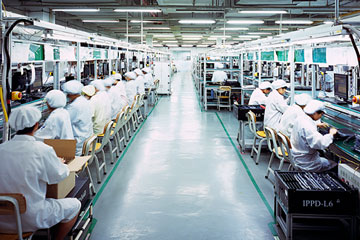
A Foxconn plant in Shenzhen, which puts together, among other products, the iPhone.
(5 of 7)
While Silicon Valley is unique--many countries, from Malaysia to Russia, are trying to create their own, with limited success--China will at least need to come close to matching American innovative prowess if it intends to compete with the U.S. in the decades to come. That will require intensive reform of its financial system, so it more effectively supports private enterprise; of its regulatory environment, to better protect intellectual property; and of its exam-obsessed education system. China's schools may excel at infusing students with strong skills, but they have been widely criticized for failing to foster the creative thinking crucial to innovative research. Even former Premier Wen Jiabao complained that "students don't only need knowledge; they have to learn how to act, to use their brains."
That forces corporate managers to lure Chinese engineers out of their shells. When Rameshbabu Songukrishnasamy became general manager of Honeywell's R&D centers in Shanghai and Beijing in 2011, he was surprised to find his engineers weren't tinkering on their own projects. "They were happy just doing what they were asked to do," he says. The problem, he determined, was that they were too worried the company would be angry if their experiments flopped. "A fear of failure is part of the culture," he says. To change that, Songukrishnasamy instituted a program in which he provides funding for personal initiatives while making it clear there is no pressure to transform them into business results. He also started workshops with role-playing and other methods to try to enhance their critical thinking. The tactics worked: his 1,500 researchers are generating more patents. Some Chinese engineers "tend to shy away from critical questioning," says Songukrishnasamy, but that process "is fundamental to R&D. The reason they are able to make so much innovation in Silicon Valley is that people question the status quo and find alternative ways."
THERE ARE TOO FEW GLOBAL BRANDS.
Though the Chinese manufacture a lot of stuff, only a handful of firms--PC giant Lenovo, and perhaps appliance maker Haier--have internationally recognized consumer brands. Those bold enough to try have sometimes struggled. Chinese sportswear maker Li Ning, for instance, has spent heavily to promote its brand and challenge behemoths Nike and Adidas, even hiring NBA superstar Dwyane Wade last year to market a line of sneakers and apparel. But the Beijing firm has failed to lure international shoppers. Sales in the first six months of 2013 plunged nearly 25%. Li Ning's problem, as with other Chinese firms, is that its management "has just gone through the motions of their competitors," says P.T. Black, a consumer strategist in Shanghai. Chinese executives are too fixated on their production and not enough on their customers to make progress on branding, he says. "There is a general weakness in what I call the humanities--an honest, committed interest in other people," he says. "If you don't consider your customer as the reason for doing things, you're in trouble when building a brand."
